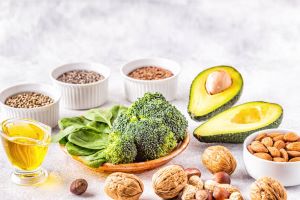Plant Omega-3s May Reduce Risk of Atrial Fibrillation for Some
By Reed Mangels PhD, RD
Atrial fibrillation, Afib for short, is an irregular heart rhythm. Some people with this condition have no symptoms; others may notice a rapid heartbeat, dizziness, or shortness of breath. Afib increases the risk of blood clots, stroke, and heart failure. It may be treated with medications, procedures, or surgery. Some studies have found that people with higher intakes of omega-3 fats from fish have a lower risk of Afib (1); however, large doses of fish-derived omega-3 fats have been associated with a higher risk of Afib (2). Many people don’t eat fish or use fish oil. Alpha-linolenic acid (ALA) is an omega-3 fat that is found in foods including green leafy vegetables, flaxseeds, flaxseed oil, and canola oil. Could ALA reduce the risk of Afib? Researchers from Denmark were interested in exploring this question.
What is the study?
The study (3) included more than 54,000 middle-aged Danish adults. At the beginning of the study, the investigators assessed the subjects’ intake of ALA and of omega-3 fats from fish based on the subjects’ records of what they ate. They were followed for a median of 17 years to see which subjects developed Afib over that time period.
What did this study find?
During the follow-up period, there were 4,902 Afib events. The researchers found that subjects eating low amounts of omega-3 fats from fish and higher amounts of ALA (more than about 1.8 grams of ALA per day) had a modestly lower risk of Afib. There was no relation between higher intake of omega-3 fats from fish and Afib. In other words, for middle-age people not eating fish or not eating much fish, higher intakes of ALA were associated with a reduced risk of Afib.
Are there practical implications?
This study suggests that middle-aged vegans and other vegetarians, as well as others who avoid or limit fish, may benefit from higher intakes of ALA to reduce the risk of Afib. Subjects with lower risk of Afib had ALA intakes of 1.8 grams per day or more – this is about the amount of ALA in 3 Tablespoons of walnuts, 2-1/2 teaspoons of chia seeds, a Tablespoon of ground flaxseeds, 1¼ cups of firm tofu, 1½ Tablespoons of canola oil, or ¾ teaspoon of flaxseed oil.
Interestingly, other studies have found that higher intakes of ALA are associated with a lower risk of sudden death, narrowing and blockage of the coronary arteries, and events related to blockage of arteries such as strokes and heart attacks but only in those with low intakes of omega-3 fatty acids from fish (4, 5). It seems prudent for vegans to eat foods that are good sources of ALA regularly.
References:
- Bork CS, Myhre PL, Schmidt EB. Do omega-3 fatty acids increase risk of atrial fibrillation? Curr Opin Clin Nutr Metab Care. 2023;26:78-82.
- Fatkin D, Cox CD, Martinac B. Fishing for links between omega-3 fatty acids and atrial fibrillation. Circulation. 2022;145:1037-1039.
- Bork CS, Larsen JM, Lundbye-Christensen S, et al. Plant omega-3 fatty acids may lower risk of atrial fibrillation in individuals with a low intake of marine omega-3 fatty acids. J Nutr. 2024; 154:2827-2833.
- Mozaffarian D, Ascherio A, Hu FB, et al. Interplay between different polyunsaturated fatty acids and risk of coronary heart disease in men. Circulation. 2005;111:157-164.
- Bork CS, Lundbye-Christensen S, Venø SK, et al. Plant n-3 PUFA intake may lower the risk of atherosclerotic cardiovascular disease only among subjects with a low intake of marine n-3 PUFAs. Eur J Nutr. 2022;61:557-559.
To read more about omega-3 fats see:

